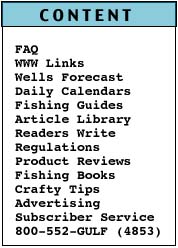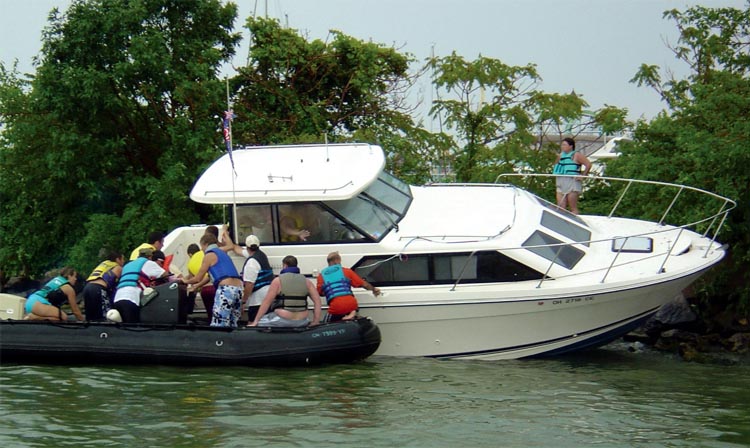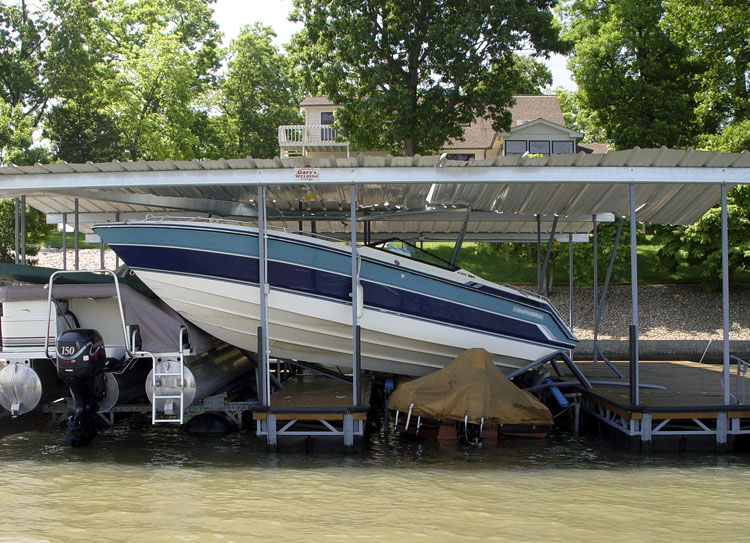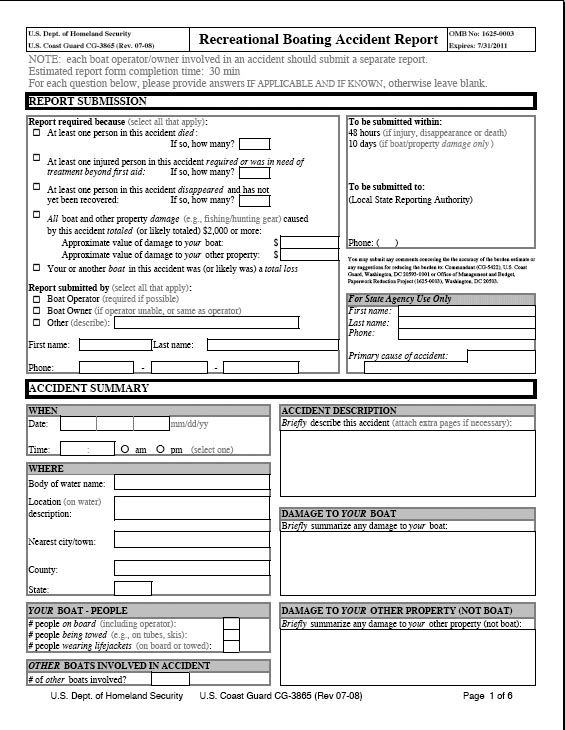
The Saltwater Magazine for Gulf Coast Fishing!
FISHING FORECASTS | FISHING CALENDARS | ARTICLES | ADVERTISE | SUBSCRIBE
Search Gulf Coast Fisherman's
Web Site
Past articles, specific
places or fish, etc.

Reporting Your Boating Accident
by Susan Tomczuk
U.S. Coast Guard Boating Safety Division
![]()
| CURRENT
MOON lunar phases |
GULF COAST
FISHERMAN T-Shirts
GCF
T's are here!
Filing a Report
Helps Identify Boat Defects, Hazardous Conditions

You may not know it, but unlike motor vehicle accidents where responsibility for filing a report - if one is required - typically falls to law enforcement officers, you as the operator or owner of a boat involved in an accident are the one required to complete and submit an official accident report. The Code of Federal Regulations (33 CFR Section 179, Subpart C) requires the operator - or owner if the operator is unable to complete the report - to file with the state boating authority.
Here's why it's important: the U.S. Coast Guard maintains detailed statistics based on boating accident reports. The resulting data helps the Coast Guard identify boat defects and boater behaviors that cause injuries and take lives. The more accurate and complete the accident report, the better job that federal, state and territorial agencies can do to make boating a safe recreational activity. Also be assured that no penalties or citations can be imposed solely on the basis of an accident report.
When You Must File
Guidelines for when to file can get a little complicated depending on the severity of the accident and the jurisdiction in which the accident occurs, but here are the basics. Federal law requires a report within 48 hours of an accident that involves a vessel or its equipment if - as a result of that accident - a person dies within 24 hours, a person is injured and requires medical treatment beyond first aid, or a person disappears from the vessel under circumstances that indicate death or injury.
A report must be filed within 10 days of an accident in which damage to vessels and other property totals $2,000 or more, there is a complete loss of any vessel, or a person dies more than 24 hours after the accident.
State and territorial laws vary, especially in terms of the property damage threshold. Some jurisdictions require boaters to report accidents with as little as $50 in damage (Alabama), so it's important to check with your state boating authority.
Of course, when an accident occurs, finding a form to fill out is usually the last thing on anyone's mind. That's why the Coast Guard recommends that you keep blank accident reporting forms on board, along with float plans and pre-launch checklists.
How to File
Most states have their own boat accident report form, which may be obtained from the state boating authority. A federal form, which is accepted by many states, can also be downloaded at http://www.uscgboating.org/statistics/cg3865barform2008.pdf. But remember, the form still should be sent to the state boating authority, either in the state where the accident occurred, the state in which the vessel is numbered or, if the vessel does not have a number, the state where the vessel is principally used. The state boating authority will review the accident report, determine a cause and forward the information to the Coast Guard.
The state boating authority is typically the Department of Natural Resources; Department of Fish, Game, and Wildlife; State Police or similar agency. If you are unsure, you can find out online by visiting www.nasbla.org. Click on "People," then click on "State Boating Contacts."
One last thing: filing an insurance claim is no substitute for filing a boat accident report, nor does filing a report substitute for filing an insurance claim. Contact your boat insurance agency for instructions and forms related to insurance claims.
* * * * *
 When
and Whether to File a Report
When
and Whether to File a Report
Remember, it's the operator of each boat involved in an accident who is responsible for filing. If the operator is unable to do so, responsibility shifts to the boat owner. Here's a quick list to help you determine when and whether you need to file a report:
You must report within 48 hours - If, as the result of an accident involving a vessel or its equipment:
o A person dies within 24 hours of the occurrence. Within 48 hours of the occurrence.
o A person is injured and requires medical treatment beyond first aid.
o A person disappears from the vessel under circumstances that indicate death or injury.
You must report within 10 days - If, as the result of an accident involving a vessel or its equipment:
o Damage to vessels and other property totals $2,000 or more (less in some states and territories) Within 10 days of the occurrence
o There is a complete loss of any vessel
o A person dies more than 24 hours after the occurrence
o Minor accidents not covered above - No report necessary.
The Benefits of Filing
Boaters should know that filing a report allows state boating authorities and the Coast Guard to identify boat defects and boater behaviors that contribute to accidents. For example, a few years back the Coast Guard received information through a state boating authority that two boaters nearly drowned because the boat they were using lacked the required amount of flotation. The report detailed how the boat swamped, dumping both boaters into the water. When they attempted to hang onto the boat, it began to sink, forcing them to swim to shore. Both survived fortunately. The Coast Guard investigation that followed resulted in the recall of 13 models (more than 5500 boats) produced by one manufacturer and very likely saved lives.
Filing also helps state boating authorities and the Coast Guard identify hazardous boater behaviors that contribute to recreational boat accidents and fatalities. These data are compiled in the Coast Guard's annual report Recreational Boating Statistics, available online at http://www.uscgboating.org/statistics/accident_stats.htm. As a result of this information, the Coast Guard was able to confirm that more than two-thirds of fatal accident victims had drowned and that 90 percent of those had not been wearing a life jacket at the time of the accident. The Coast Guard also confirmed that fewer than 10 percent of fatalities occurred on boats where the operator had received boating safety instruction.
Note: Most boating accidents are not as dramatic as these, but may still need to be reported. Most states have their own form for reporting boating accidents, but most will also accept the federal form shown here.

The U.S. Coast Guard is asking all boat owners and operators to help reduce fatalities, injuries, property damage, and associated healthcare costs related to recreational boating accidents by taking personal responsibility for their own safety and the safety of their passengers. Essential steps include: wearing a life jacket at all times and requiring passengers to do the same; never boating under the influence (BUI); successfully completing a boating safety course; and getting a Vessel Safety Check (VSC) annually from local U.S. Coast Guard Auxiliary, United States Power Squadrons®, or your state boating agency's Vessel Examiners. The U.S. Coast Guard reminds all boaters to "Boat Responsibly!" For more tips on boating safety, visit www.uscgboating.org.

